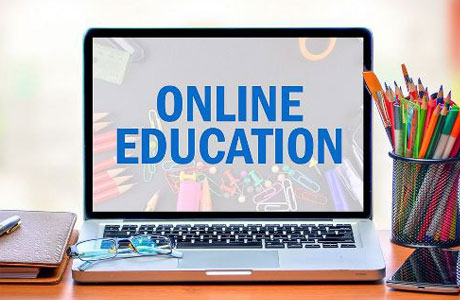Online Education: A Hobson’s Choice

Umesh Raj Regmi
WHEN the government decided to stop physical classes of all academic institutions in the country, around 8.5 million Nepali students from nursery to tertiary level are again in a state of dilemma. Students and teachers had just returned to schools, colleges and universities after a nine-month tiresome gap before the announcement of a nationwide closure of educational institutions for battling the second wave of the coronavirus. On one hand, they have lessons to finish, exams to take, and an academic session to complete while they have the responsibility of continuing students’ learning remotely, on the other. There needs to be a decision on examinations and academic session later but the classes to run regularly in the shutdown period as directed by the authority.
The COVID-19 pandemic has already dealt a catastrophic blow to students and caused an unimaginative suffering to them educationally, socially and emotionally. The decision to shut schools, colleges and universities was deemed to protect children and youths from being infected with the virus disease but the halt in usual teaching and learning won’t be alright with the present status of virtual learning. What is concerning more is whether the online classes are pragmatic.
Ineffective e-learning
A study report published by the National Campaign for Education (an umbrella body of over 300 organisations working in the education sector) in December 2020 showed virtual learning was ineffective for 64.3 percent of the surveyed students. The survey carried out among 770 students, guardians and teachers from different districts in seven provinces revealed the learning achievement through virtual classes was low. Though over 60 per cent of schools were found to have prepared a plan for the virtual learning, it was not implemented at the community level, said one of the researchers. It also demonstrated a lack of coordination between the three tiers of government in running virtual classes effectively.
Similarly, a survey report by UNICEF-Nepal published in August last year displayed that more than two-thirds of school children in Nepal are deprived of distance learning opportunities. The fact was that only 5 per cent of students in the poorest households have access to and use distance learning. Internet is a must for most online class platforms in question. At this point, the past year’s report of the Ministry of Education, Science and Technology (MoEST) said only 13 per cent public secondary schools in the country had internet access. Another study by Sharecast Initiative showed that 43 per cent of the total population in Nepal has internet access. These data hint at the limited access of internet, data package and electronic gadgets to the students of public schools and campuses.
In addition, the efficacy of virtual class, interest of students and teachers, skills and ideas in its operation, electricity reach and comfortable setting on the part of students and teachers matter in running digital classes in actual sense. This experience should have pushed the government authorities and academic institutions to explore ways to make online classes more effective. Despite having difficulties in running online classes in the past, neither the government nor the schools gave a thought about improving the system. When schools re-opened after the decrease in infections, everything was considered to be back to normalcy. If the closure gets extended, there will be again a discussion as how to fare students of private institutions. That online classes are inaccessible and ineffective is one part. The pandemic has also exacerbated the digital divide.
Virtual classes are now considered to be the second teacher for the students of varied needs and potentials. Such classes, however, cannot benefit students of different levels, fields of study and abilities of a similar standard. Students with certain disabilities have problems with online classes. Students of technical education need to be treated a bit differently from that of those pursuing general education. In this regard, teachers' preparation for delivering the contents and assignments play a pivotal role. It seems relatively difficult to make an online class interactive and student-centred with a large group and mixed needs of the students. Mathematics and numeric subjects require a problem solving approach while preparing class notes and slides for the students of different levels. Medium of instruction and teacher’s presentation style may also be a reason for dim or clear understanding of the topic. Hence, it is not easier to bridge the digital divide to provide equal opportunities to every learner out there.
Proactive approach
The line ministry and authorities of all tiers of government should work for making proactive approach rather than taking reactive decisions on education. The best the authorities could have done - and must do now - is to come up with clear and doable policies, and invest in resources and training for public schools to improve remote learning. An ad hoc directive on students’ learning poses a problem in the execution of plan as well as meaningful learning. It’s a high time the concerned agencies explored possible options for examinations during closure and better practices of virtual learning. It is not wise to wait for the normal situation and traditional approaches of closing the education institutions. The past educational activities and students' loss of time has taught us more in being prepared for any circumstances ahead.
It is recommended to have a proper discussion at the local level and with all stakeholders before making an important decision on educational matter. Lackadaisical tendency must end when it comes to the management of alternative learning. Without any delay, the concerned agencies have to sit for an open discussion to take the scheduled examinations through any means and keep the academic session intact. The delay in making preparation in advance will make the entire academic realm reel into dilemma. Let us work together for ensuring the access and impact of online education, which is only option at the moment.
(The author is associated with Nepal Youth Foundation.umesh_regmi71@yahoo.com)
source: Umesh Raj Regmi, Rising Nepal, 7 May 2021
Posted on: 2021-05-07




























